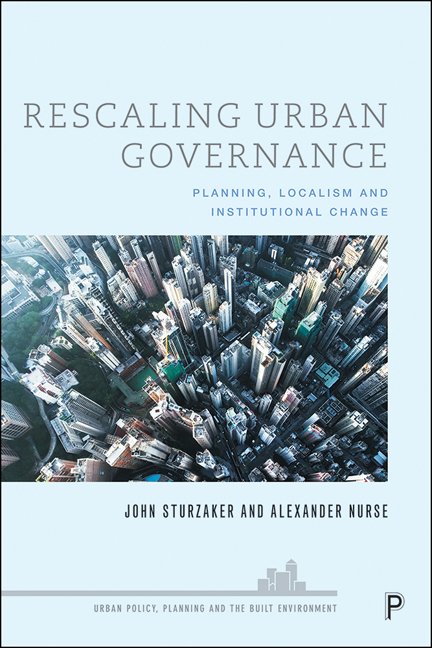Book contents
- Frontmatter
- Dedication
- Contents
- List of Tables, Figures and Boxes
- Notes on Authors
- Glossary
- Acknowledgements
- 1 Introduction: Planning Reform and State Spatial Rescaling
- 2 Devolution: A Patchwork Quilt of Planning Reform
- 3 Replacing the Regions: The evolution of English Subnational Reform
- 4 City Regions and the Cities Within Them: Connecting two Overlapping Scales
- 5 Local Authorities: Powerhouses or Scapegoats?
- 6 Community-led Governance: Opportunities and Constraints
- 7 Conclusion: Rescaling Urban Governance
- References
- Index
3 - Replacing the Regions: The evolution of English Subnational Reform
Published online by Cambridge University Press: 03 March 2021
- Frontmatter
- Dedication
- Contents
- List of Tables, Figures and Boxes
- Notes on Authors
- Glossary
- Acknowledgements
- 1 Introduction: Planning Reform and State Spatial Rescaling
- 2 Devolution: A Patchwork Quilt of Planning Reform
- 3 Replacing the Regions: The evolution of English Subnational Reform
- 4 City Regions and the Cities Within Them: Connecting two Overlapping Scales
- 5 Local Authorities: Powerhouses or Scapegoats?
- 6 Community-led Governance: Opportunities and Constraints
- 7 Conclusion: Rescaling Urban Governance
- References
- Index
Summary
Introduction
Today, London enjoys a hegemonic dominance over UK policymaking – both politically, and economically. London dwarfs the other UK cities in almost every major marker of economic development, while enjoying planning projects and levels of investment that other UK cities could only dream of. Yet this was not always the case. Historically, during the height of the British Empire, other cities such as Liverpool far outstripped London in terms of economic contribution (Sykes et al, 2013; Wilks-Heeg, 2003), and other research suggests that London only really began to grow in the levels taken for granted today as a result of policy in the 1980s while remaining insulated from comparative downturn in the 1990s (Robson et al, 2000). In addition, and as discussed in Chapter 2, it can be argued that in the last 20 years, London's growth has been driven by a level of political autonomy and investment hitherto unseen by other UK cities. Combined, this has deepened the so-called ‘North–South’ divide, a planning issue that enjoys the same ubiquity as the green belt in terms of public recognition.
It is the most recent attempts to address this ‘growth gap’ (Dorling and Thomas, 2004; McCann, 2016) – made a priority by the post-2010 coalition – to which this chapter turns. To achieve this, the government rolled out a programme of sub-national reform over the course of four years. Labelled as devolution (although different in form and nature to the national-scale devolution discussed in Chapter 2), the government's basic premise was comparatively simple: move decisionmaking and nominal levels of spending control to the UK cities as a means to encourage economic growth. This began with a focus on cities and their wider regions, developing into something larger as, driven by Chancellor George Osborne, the government tried to foster urban agglomerations, dubbed the ‘Northern Powerhouse’ and the ‘Midlands Engine’. As we will see, this agenda did not appear overnight, but rather coalesced over several years as a series of policy reforms aligned with a common thread.
- Type
- Chapter
- Information
- Rescaling Urban GovernancePlanning, Localism and Institutional Change, pp. 43 - 72Publisher: Bristol University PressPrint publication year: 2020



